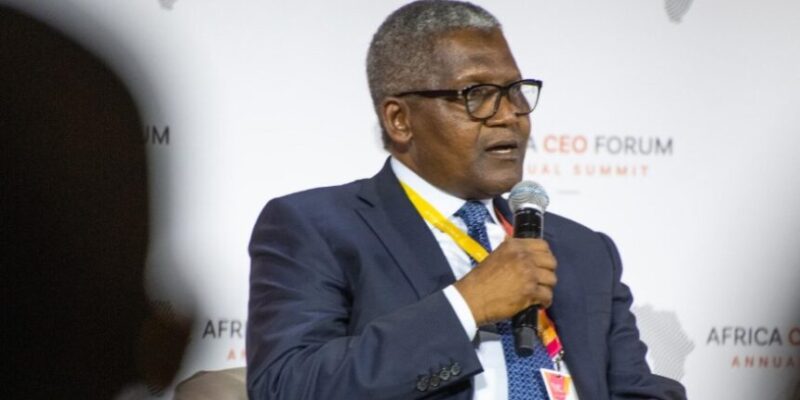The President of Dangote Group, Alhaji Aliko Dangote, has urged President Bola Tinubu to expand the scope of the Federal Government’s ‘Nigeria First’ policy by banning the importation of refined petroleum products into the country—a proposal that has drawn strong criticism from oil marketers and industry experts.
Dangote made the appeal at the Global Commodity Insights Conference on West African Refined Fuel Markets, hosted by the Nigerian Midstream and Downstream Petroleum Regulatory Authority (NMDPRA) in collaboration with S&P Global Insights. He argued that the continued importation of petrol, diesel, and other refined fuels was stifling local refining operations and discouraging further investment in the sector.
“The ‘Nigeria First’ policy announced by His Excellency, President Bola Tinubu, should apply to the petroleum products sector and all other sectors,” Dangote said. “Importation of fuel is killing local refining, and it is imperative we protect domestic producers as the United States, Canada, and the European Union have done.”
According to the billionaire industrialist, Nigeria is being flooded with cheap, substandard, and sometimes toxic petroleum products—many of which are subsidised in countries like Russia. He claimed this has created an uneven playing field, forcing local refiners to sell below cost.
“In Nigeria, due to unfair competition, petrol prices have dropped to about 60 cents per litre—cheaper than even in oil-producing nations like Saudi Arabia,” he said.
Dangote also dismissed suggestions that he was seeking to dominate the market, stating that his push for import restrictions is not an attempt at monopolisation but rather a call for strategic protection of local investments.
“The reality is that many who have the means to invest in Nigeria prefer to channel their resources abroad while criticising local efforts,” he added.
The business magnate further revealed that Nigeria has already become a net exporter of petroleum products, claiming that his $20bn refinery exported over 1.35 billion litres of petrol between June and July 2025.
Marketers, Experts Push Back
Despite the economic logic put forward by Dangote, his proposal was met with stiff opposition from key stakeholders in the downstream sector.
The National Publicity Secretary of the Independent Petroleum Marketers Association of Nigeria (IPMAN), Chinedu Ukadike, warned that such a ban would foster monopoly and fuel inflation.
“If the government bans importation now, we will lose our ability to regulate prices and ensure supply. We support local refining, but importation must continue to allow for competition,” Ukadike told [news outlet].
He added that the Dangote refinery alone cannot meet Nigeria’s fuel demand, a view reportedly shared by the NMDPRA.
Also rejecting the proposal, Billy Gillis-Harry, National President of the Petroleum Products Retail Outlet Owners Association of Nigeria (PETROAN), insisted that no single company should dominate the energy sector in a liberalised economy.
“While I agree that some goods should be banned if produced locally—like toothpicks and garri—refined petroleum is not in that category. We need multiple supply sources to ensure energy stability,” he said.
Energy law expert and lecturer at the University of Lagos, Professor Dayo Ayoade, echoed these concerns. He warned that banning fuel imports would not only violate trade principles but could pose risks to energy and national security.
“You don’t give one private entity a monopoly over a strategic national asset. That’s dangerous,” he stated. “Until we have a diversified base of refineries, including possibly privatised NNPC plants, banning imports would be premature.”
Ayoade also raised concerns about compliance with international trade laws, arguing that outright bans could trigger disputes under global trade agreements.
More Refineries Needed
Despite the disagreement on import bans, stakeholders found common ground on the need for more local refining capacity.
Dangote urged the NMDPRA to revoke refinery licenses that have remained dormant and called for policies that would encourage genuine investors.
IPMAN’s Ukadike agreed, stressing that unused refinery licenses serve no national purpose. “You can’t be holding a license just for show while the country needs refining capacity,” he said.
Dangote, who recently stepped down as Chairman of Dangote Cement to focus fully on his energy ventures, confirmed that his refinery is ramping up operations and is expected to hit 700,000 barrels per day capacity by December 2025, up from its current 650,000 BPD.
Meanwhile, the refinery is set to launch its free fuel delivery initiative on August 1, deploying 4,000 compressed natural gas-powered trucks to deliver petrol, diesel, and aviation fuel directly to filling stations and large consumers like telecom firms.
As the debate over Nigeria’s fuel policy intensifies, stakeholders agree that the priority should remain on building a stable, diversified, and competitive downstream sector—without compromising consumer access or national energy security.

Comments